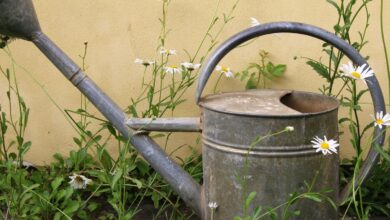Urban Beekeeping Guide: How To Raise Bees In The City

[ad_1]
Urban beekeeping, also known as apiculture, is on the rise. It’s a way to bring more nature to your garden and boost pollination. Some people simply enjoy the hobby of raising and caring for bees. Whatever your reasons for considering having an urban beehive in your garden, consider the pros and cons and other details.
Benefits of Urban Beekeeping
Raising bees in the city has become popular for several reasons. Apiarists find many benefits of keeping hives in gardens or on urban rooftops:
- Enjoy and sell your own honey – One of the most obvious benefits of caring for a community of honeybees is access to the freshest, most local honey available. A hive can produce anywhere from 25 to 100 pounds of honey per year. It’s plenty to enjoy yourself and to sell for a little extra income.
- Produce a bumper crop – As pollinators, honeybees are essential for the production of food. If you grow vegetables and fruits, a hive can significantly increase your crop yield.
- Support flagging bee numbers – A decline in bees has been in the news for years now and is alarming because of the necessity of pollinators for food production. Colony collapse is an ongoing issue. Raising and supporting healthy bees can help offset the decline.
- Connect with nature – Another benefit of beekeeping in the city is that it allows you to connect with nature. This connection can be hard to come by in the city, but caring for bees is a way to get in touch with the natural world in a unique way.
The Downside of Urban Beekeeping
Not everything about beekeeping in the city is positive. The most obvious downside is that it takes time, money, and skill to keep successful hives. You must be committed to doing it right or risk losing your hives.
Many people are motivated to keep bees because of the decline in pollinators, but it isn’t necessarily the best solution. Recent research has found that urban keeping of honeybees can actually harm local native bee populations. Honeybees are not native to North America. In cities, they often out-compete native bees and reduce their numbers.
Most importantly, beekeeping is actually against the law in many towns and cities. Make sure to check your local restrictions before you put in all the money and effort.
How to Start Urban Beekeeping
Successful beekeeping is a learned skill. If you have determined you are legally allowed to keep bees in your city and want to move forward, contact an experienced apiarist in the area. Learning from a successful apiarist is the best way to set yourself up for success. You can also look for local classes in beekeeping through your local extension office or a community college.
To start beekeeping, you’ll need a hive, which you can buy online. You also need additional equipment, including protective gear, a smoker, and a scraper. Of course, you also need bees. You may be able to find some available locally, but you can also buy starter frames with bees online. Once you have a good setup, learn how to maintain the hive. Honeybees require year-round care.
See how Hood Honey, one of our GKH Grant Recipients, has gone about keeping bees in the city.
Frequently Asked Questions
Is Beekeeping Legal in My City?
Some cities freely allow urban apiculture, some regulate it, and others ban it completely. Before bringing hives into your garden, check with your municipal government to find out if beekeeping is allowed, and if so, any rules you must follow.
What Is the Difference Between Urban and Rural Beekeeping?
The basics of keeping bees is the same no matter where you live. Keeping backyard beehives can be easier in rural settings because of access to more space and more plants that the bees can use. In cities, beekeepers have space constraints. They may need to provide additional plants to ensure the bees survive.
[ad_2]
Source link






